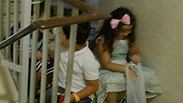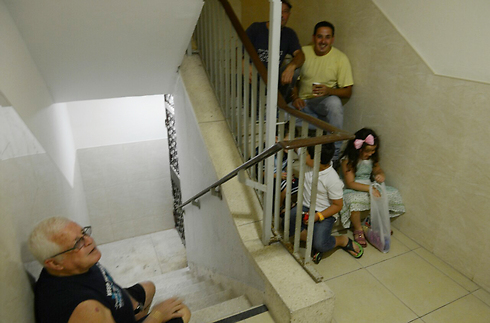
Life under fire: How ordinary Israelis live with the rockets
As the rockets from Gaza continue to rain down, the Home Front Command has issued a series of guidelines to ensure the safety of the civilian population.
The Home Front Command has issued fresh guidelines to Israelis in the wake of the extensive rocket barrage at southern communities Monday night. For the first time since the IDF's Operation Pillar of Defense in 2012, there is a ban on gatherings of more than 300 people within a 40km radius of the Gaza Strip. Furthermore, there will be no activities at summer camps, kindergartens and special education facilities within this range - except for the heavily defended towns close to the Gaza Strip.
Towns and cities affected by the new guidelines include Ashkelon, Ashdod, Be'er Sheva, Netivot, Sderot, Kiryat Malachi, Kiryat Gat, Gedera, Yavne, Gan Yavne, Lakiya and Rahat. Shopping centers and workplaces, however, are not required to follow the new instructions.
Ben-Gurion University of the Negev announced Tuesday that exams have been postponed and will be rescheduled. Sapir College on the outskirts of Sderot has also delayed its exams, while the Shamoon College of Engineering has suspended classes and exams at its Be'er Sheva and Ashdod campuses, and Ahva College, east of Ashdod, has taken similar steps .
WATCH: Short instruction film for choosing a secure shelter
In addition, the local authorities bordering Gaza, as well as Ashkelon, Ashdod and Be'er Sheva , have opened their public shelters. And southern communities aside, the Iron Dome missile defense system has in recent days been deployed in other locations across the country.
In Be'er Sheva, Soroka Hospital has decided to transfer its neonatal ward – holding 23 premature babies, five of whom are on respirators - to a protected area. Hospital director Dr. Ehud Davidson said that the medical center had begun preparing based on the assumption that a difficult period lay ahead.
"The neonatal ward at Soroka is not reinforced, and out of concern for the premature babies, we decided it was time to transfer them temporarily to a protected area. The NICU staff has experience in this type of transfer from Operation Cast Lead, Pillar of Defense and other escalations."
Israel Railways also been affected by the barrage of rockets. Since the start of the heavy rocket fire, moving trains have slowed their speed, in accordance with Home Front Command guidelines. Following the heavy bombardment, there have been some train delays in parts of the country. According to Home Front Command instructions, trains that are at the station when the rocket alert sounds must remain there for seven minutes, after which they must continue at a reduced speed until leaving the area. Trains between stations during a rocket alert must slow down until they reach the boundaries of the sector.
Some 2,400 scouts were evacuated during a camping trip on Monday in the Haruvit forest, east of Ashdod. Dozens of buses evacuated the scouts, and took them home.
The mother of two girls taking part in the trip told Ynet that they were very disappointed by the decision.
"They called and said that they were taking them home. I do not see why they had to be split up right now. There were children crying hysterically and I'm sure there were parents who had taken time off who could go pick them up."
Dozens of rockets were fired at southern Israel on Monday, 30 of which landed in open areas, with another 12 brought down by Iron Dome over Netivot and Ashdod.
The Hamas military wing claimed responsibility for the rocket fire on Netivot, Ashdod, Ofakim and Ashkelon, for the first time since the current round of hostilities began. Speaking in Arabic on Al-Jazeera, the IDF Coordinator of Government Activities in the Territories, Major General Yoav Mordechai called on Hamas to immediately stop firing rockets into Israel.
"Calm will be answered with calm," Mordechai said, stressing that escalation would only lead to more escalation and a harsh IDF response. He said Hamas had taken the decision to wreak havoc on the Gaza Strip during Ramadan as distraction from its own economic and social problems.
Itay Blumenthal and Shahar Hai contributed to this report











